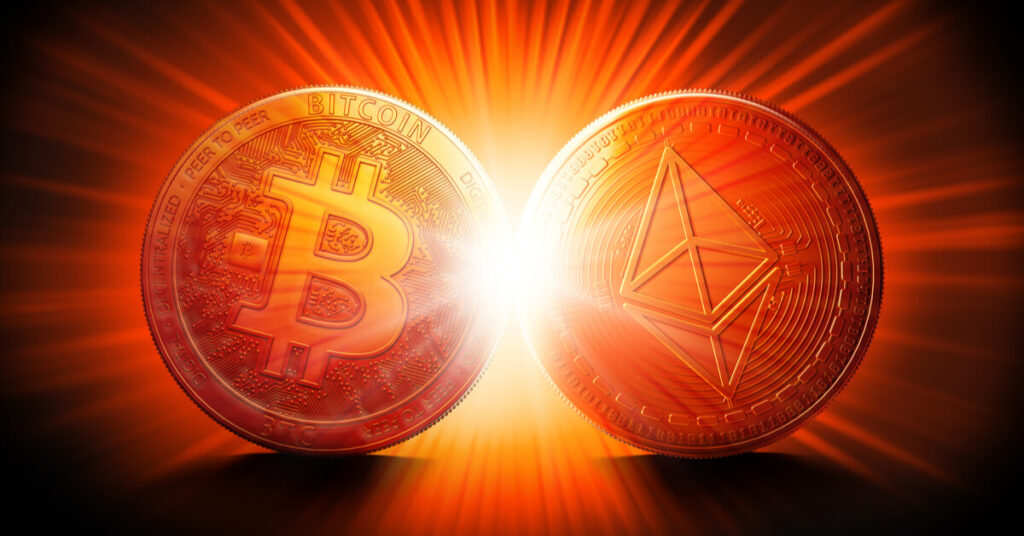
Why is Ethereum, Bitcoin’s Biggest Competitor?
In 2009, Bitcoin burst into the public domain with Satoshi Nakamoto’s now-famous white paper entitled “Bitcoin: A Peer-to-Peer Electronic Cash System”. In it, Nakamoto proposed an innovative new decentralized ledger system called blockchain. Fast forward 11 years, an industry worth over $1.55 trillion has grown around Nakamoto’s idea, with countless projects under its wing.
The most popular of these projects, after Bitcoin, is Ethereum (ETH). Ethereum is the largest open-ended, decentralized software platform in the world. Launched in July 2015, Ethereum was designed and developed by Russian decentralized ledger enthusiast, Vitalik Buterin. He wanted to create a platform that would make it easy for developers to build and manage blockchain-based decentralized applications (dApps), set up ‘Smart Contracts’, and even create new cryptocurrencies, all using a purpose-built programming language.
Today, Ethereum’s popularity has garnered it a market capitalization of over $406 billion. In this article, we examine its history, explore its unique protocol, and try to understand why it is considered blockchain’s second-in-command.
If you’ve already decided you want to buy some Ethereum, jump over to our buying guide here and get buying straightaway!
Smart Contracts and dApps
A dApp is an application that runs on a distributed platform. This puts its development and maintenance outside the control of any single individual, which in the cryptocurrency world, is canon.
The benefits of dApps become clear when you consider their application in finance. If individuals want to group together to manage their capital (say in a mutual fund type arrangement), instead of nominating a fund manager to do so on their behalf, they can create a dApp with a certain set of pre-agreed upon management rules. This removes the need for any one individual to be trusted to act in good faith on behalf of all those individuals.
This is also essentially what a ‘Smart Contract’ is; an agreement between parties whose outcome is automatically executed when its pre-agreed terms are fulfilled. These contracts are written in a programming language built for Ethereum called Solidity. Again, the idea is to remove the middlemen that normally act as go-betweens for those parties (the lawyers and judges) who are required to be trusted by those parties.
The DAO
In 2016, these concepts came into their full glory with the launch of the world’s first decentralized autonomous organization, or DAO for short. The DAO’s objective was to provide the blueprint for the governance of a decentralized business. Each investor would have a cryptographic share of the business and would be able to vote on every decision it made. Power decentralized.
Unfortunately, the DAO had a fault that allowed a hack to take place that eventually led to a split in the community and to the creation of Ethereum Classic, ETC. However, that a project that was able to contest the age-old model of business organization, was built so easily using the Ethereum platform, is testament to Ethereum’s pioneering nature and subsequent popularity. In the years since, several crypto communities have formed their own DAO’s.
The ERC-20 Standard
If getting us to think about changing the way we fundamentally do business wasn’t enough, Ethereum also created a technical blueprint on which literally thousands of altcoins are based; the ERC-20 standard. The standard is a set of rules that any token developed on the Ethereum network has to implement.
Essentially in setting a standard for token development, Ethereum made it easy for institutions, such as cryptocurrency exchanges, or projects involving dApps or Smart Contracts to work with altcoins as they now only needed to develop software to one standard which, in turn, would work with any ERC-20 based altcoin. Basically, Ethereum became to ERC-20 tokens, what Bitcoin was to Namecoin, to Litecoin, to Dogecoin, and even to Ethereum itself; the pioneer.
Bitcoin’s No.2
With all of the above in mind, it isn’t difficult to see why Ethereum has become so popular. With Bitcoin and its blockchain, the world was introduced to the idea of storing and transferring information or value in a decentralized way, free of the need to rely on trusted third parties to validate that information or value.
Ethereum took that idea to the next level, making it easier to develop applications using blockchain technology and write agreements using a purpose-built language that was much easier to understand. It also set the standard which allowed the industrial-scale production of many of the cryptocurrencies we use today, which, in and of itself, propelled the value of the industry to extraordinary heights.
Today, Ethereum is valued at $301 billion, compared to Bitcoin’s enormous $754 billion. However, it is estimated that the combined value of all ERC-20 compatible altcoins is over $200 billion, with the largest stablecoin, an ERC-20 compatible altcoin called USDT, worth $70 billion alone. Like Bitcoin, since its launch in 2015, Ethereum has seen astronomical growth in its own value, with investors seeing a return-on-income of over 8000% to date since launch.
And the progress doesn’t stop there. Ethereum has launched Ethereum 2.0, an effort to move the pioneering platform towards a radically different process of decision making that will be both greener – reducing Ethereum’s energy consumption by more than 99% – and simpler. Ethereum’s new staking model is expected to be roughly 7,000 times more energy-efficient than Bitcoin.
There seems little doubt following these developments, its value both nominally and to the wider industry will likely continue to grow, and it will continue toi challenge and complement its predecessor Bitcoin. All eyes on Ethereum.
After reading all of that, you’re probably considering buying some Ethereum… Luckily, Xcoins.com is the perfect place to do just that. Check out our buying guide here and get buying straightaway!
To stay up to date on all things crypto, like Xcoins on Facebook, follow us on Twitter and LinkedIn and sign up at the bottom of the page to subscribe.








